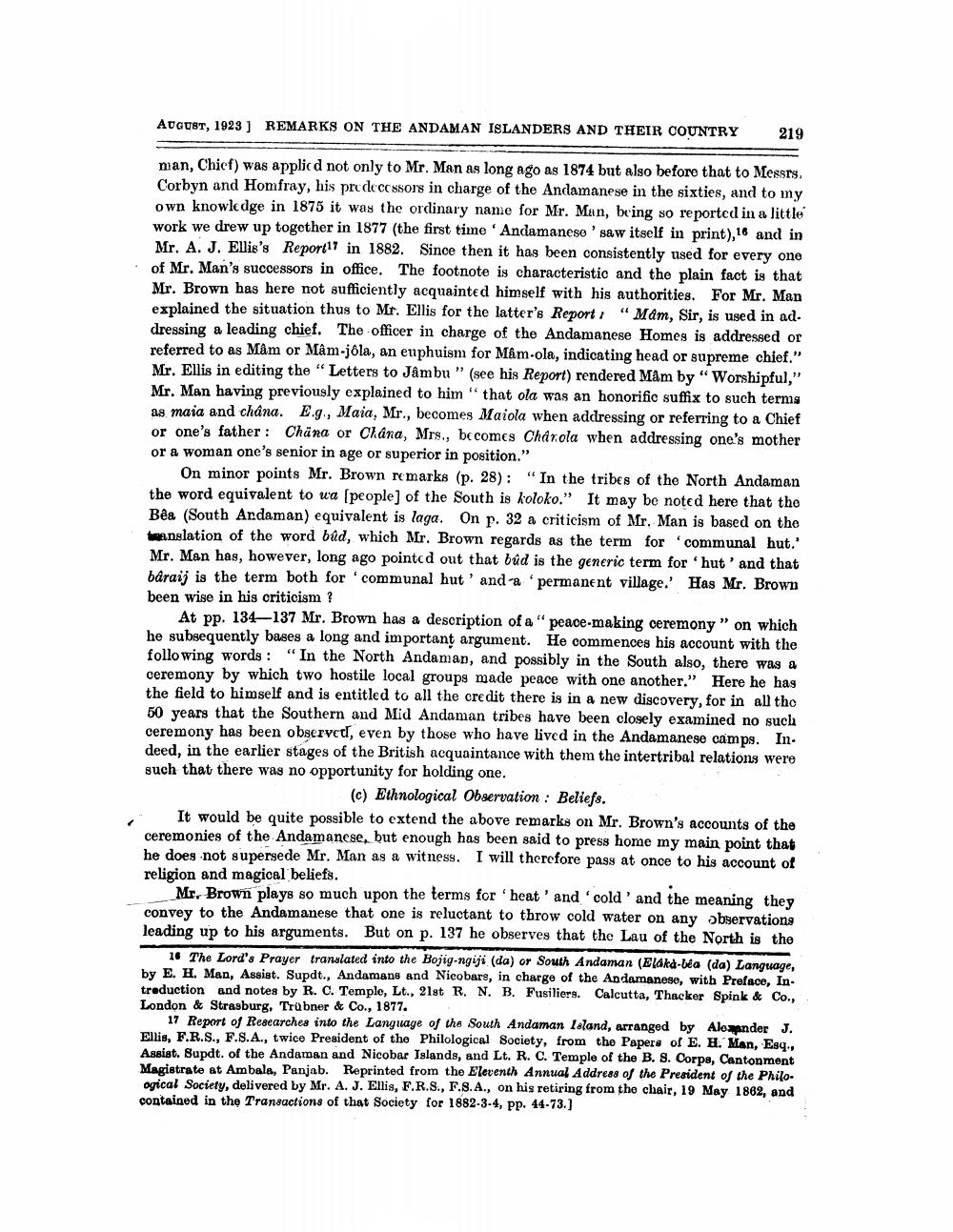________________
AUGUST, 1923] REMARKS ON THE ANDAMAN ISLANDERS AND THEIR COUNTRY
man, Chief) was applicd not only to Mr. Man as long ago as 1874 but also before that to Messrs. Corbyn and Homfray, his predecessors in charge of the Andamanese in the sixties, and to my own knowledge in 1875 it was the ordinary name for Mr. Man, being so reported in a little work we drew up together in 1877 (the first time Andamanese' saw itself in print),16 and in Mr. A. J. Ellis's Report1 in 1882. Since then it has been consistently used for every one of Mr. Man's successors in office. The footnote is characteristic and the plain fact is that Mr. Brown has here not sufficiently acquainted himself with his authorities. For Mr. Man explained the situation thus to Mr. Ellis for the latter's Report "Mam, Sir, is used in addressing a leading chief. The officer in charge of the Andamanese Homes is addressed or referred to as Mâm or Mâm-jôla, an euphuism for Mâm-ola, indicating head or supreme chief." Mr. Ellis in editing the "Letters to Jâmbu" (see his Report) rendered Mâm by "Worshipful," Mr. Man having previously explained to him "that ola was an honorific suffix to such terms as maia and châna. E.g., Maia, Mr., becomes Maiola when addressing or referring to a Chief or one's father: Chana or Chana, Mrs., becomes Charola when addressing one's mother or a woman one's senior in age or superior in position."
219
On minor points Mr. Brown remarks (p. 28): "In the tribes of the North Andaman the word equivalent to wa [people] of the South is koloko." It may be noted here that the Bêa (South Andaman) equivalent is laga. On p. 32 a criticism of Mr. Man is based on the anslation of the word bûd, which Mr. Brown regards as the term for communal hut.' Mr. Man has, however, long ago pointed out that bûd is the generic term for 'hut' and that bâraij is the term both for 'communal hut' and a 'permanent village.' Has Mr. Brown been wise in his criticism?
At pp. 134-137 Mr. Brown has a description of a "peace-making ceremony" on which he subsequently bases a long and important argument. He commences his account with the following words: "In the North Andaman, and possibly in the South also, there was a ceremony by which two hostile local groups made peace with one another." Here he has the field to himself and is entitled to all the credit there is in a new discovery, for in all the 50 years that the Southern and Mid Andaman tribes have been closely examined no such ceremony has been observed, even by those who have lived in the Andamanese camps. Indeed, in the earlier stages of the British acquaintance with them the intertribal relations were such that there was no opportunity for holding one.
(c) Ethnological Observation: Beliefs.
It would be quite possible to extend the above remarks on Mr. Brown's accounts of the ceremonies of the Andamanese, but enough has been said to press home my main point that he does not supersede Mr. Man as a witness. I will therefore pass at once to his account of religion and magical beliefs.
Mr. Brown plays so much upon the terms for 'heat' and 'cold' and the meaning they convey to the Andamanese that one is reluctant to throw cold water on any observations leading up to his arguments. But on p. 137 he observes that the Lau of the North is the
16 The Lord's Prayer translated into the Bojig-ngiji (da) or South Andaman (Elákà-béa (da) Language, by E. H. Man, Assist. Supdt., Andamans and Nicobars, in charge of the Andamanese, with Preface, Introduction and notes by R. C. Temple, Lt., 21st R. N. B. Fusiliers. Calcutta, Thacker Spink & Co., London & Strasburg, Trübner & Co., 1877.
17 Report of Researches into the Language of the South Andaman Island, arranged by Alexander J. Ellis, F.R.S., F.S.A., twice President of the Philological Society, from the Papers of E. H. Man, Esq., Assist. Supdt. of the Andaman and Nicobar Islands, and Lt. R. C. Temple of the B. S. Corps, Cantonment Magistrate at Ambala, Panjab. Reprinted from the Eleventh Annual Address of the President of the Philoogical Society, delivered by Mr. A. J. Ellis, F.R.S., F.S.A., on his retiring from the chair, 19 May 1862, and contained in the Transactions of that Society for 1882-3-4, pp. 44-73.]




